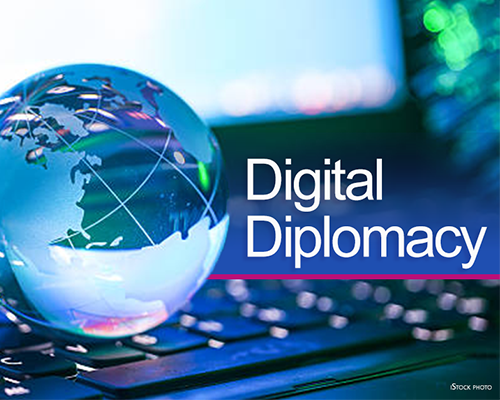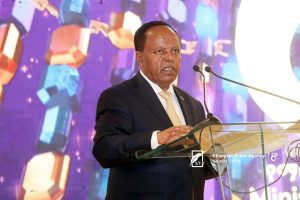
BY KFLEEYESUS ABEBE
Digital platform is allowing nations to revise or reform the way they do their business. Diplomacy is no different. Many nations are turning into digital platforms to do their routine diplomatic undertakings. This time, digital diplomacy is increasingly becoming the order of the day for various reasons. The COVID-19 outbreak for instance is emboldening nations to migrate to cyber space to meet the diplomatic needs. At a time when travel drops and physical contact becomes a taboo, diplomats continue spending more time on zoom and other sites to execute their missions.
More digital diplomacy arguably means less manpower in foreign missions. Cutting the number of diplomats hence is on the cards for countries that inject huge chunk of forex into their diplomatic works. With digital diplomacy, countries can reach out to their citizens and other nations residing at far flung corners of the globe with a blink of an eye. Besides, the expansion of cyber space is also encouraging citizens to serve as public diplomats.
Against this backdrop, Prime Minister Abiy Ahmed lately announced government decision to reduce the number of overseas missions. The move is unexpected and many people are still wondering in what way the country will maintain its diplomatic relation with respective countries its embassies to be closed. While addressing lawmakers three weeks before, the premier said “Ethiopia need to close at least 30 of its embassies. The ambassadors of embassies to close may follow up from Addis Ababa.”
Prime Minister Abiy said the measure will have dual benefits as in one hand saves foreign currency and the other helps to restructure and solve current diplomatic drawbacks.
He indicated as there many Ethiopians abroad who are doing remarkable work promoting their country without pay comparable and at times exceeding our foreign missions. So it fair to assume Ethiopia will embrace new diplomatic approach to achieve its goal. The new diplomatic approach that nations across the world are practicing especially after COVID-19 is digital diplomacy.
Digital diplomacy is practiced by information and communication technology (ICT) platforms and capabilities. It has now grown exponentially over the short duration of the COVID-19 pandemic. On top of reducing foreign currency expenditure, the implementation of digital diplomacy for Ethiopia would be timely as coronavirus is spreading and affecting activities of embassies and consulates.
Addis Ababa University, MA student of International Relation and Diplomacy, Gizachew Getnet defended the government’s decision stating it is very common practice for countries to decrease foreign missions in times of economic woes or other factors. “This is customary in diplomatic environment. Governments may opt to use public diplomats when public diplomats have skills and resources to take over the task of the missionary. If country doesn’t think its resident embassies aren’t effective or achieving its objectives due to lack of adequate skills or other reasons, they may take such measures. They shrink their staff numbers or number of embassies may be closed for a time being. This will help them to save foreign currency and give time to upgrade skills of diplomats. Public diplomats could take over the task in this time. This doesn’t mean the embassies stay closed forever. When things get normal and when there are skilled diplomats they might be open.”
Gezachew stressed that the closure doesn’t mean there is no diplomatic mission. It rather suggests diplomatic missions are to be carried out cost effectively and integrated and organized manner. “For instance, Ethiopian resident ambassador in Kenya could also be a representative and operate in Uganda, Rwanda, Burundi and Tanzania too.”
Gezachew highlighted in normal circumstances diplomacy is institution base with strategy, principle and policy direction. He is well aware of the necessity of incorporating digital diplomacy and individuals with skills and resources.
“A diplomat has to know current situation of countries, historical relation, ideology and other factors that determine ties of nations. A public diplomacy now the office of the prime minister running is a missionary that is necessary for time. The charisma and skills of this people could help strengthen bureaucratic apparatus of the foreign relation bureau.”
The lecturer says this digital diplomacy helps to solve current problems the country is facing. Along with other diplomatic ways, digital diplomacy could be a way to provide fast response for current challenges.
Gizachew didn’t rule out the necessity of public and digital diplomacy, but he pinpointed that digital diplomacy demands effective leadership. Public Diplomats must be equipped with necessary knowledge and skills of diplomatic sphere.
“Digital diplomacy isn’t classical diplomacy. It is an emerging diplomatic approach that helps to mobilize people on given issue. It collaborate people with skill and experience. It could be a means to build up the bureaucratic apparatus but we should also be careful in equipping these people with basic knowledge on nature of diplomacy. We should know the people we involve, who will manage them and what kind of knowledge they should possess. These are necessary when you dive to digital diplomacy. ”
In the meantime, Ethiopian Diasporas across the world are voluntarily assisting Ethiopian diplomatic missions. The diaspora has engaged in digital activism that helped the international community to understand Ethiopia’s position on key agenda.
Last month only there was a surge of digital campaigns the ministry and concerned bodies are organizing. As it is increasing from time to time, it has influenced Ethiopian diplomatic activities to good. And Ethiopia is considering to increasing the involvement of these people and digital diplomacy in general. The efficacy of digital diplomacy has been proved in Ethiopia’s diplomatic achievement in the Grand Ethiopian renaissance Dam. It has also borne fruit as it pushed Congresswoman Karen Bass to sit with Ethiopian Americans Civic Association about situation in Ethiopia. The event helped to Ethiopians to voice their disappointment of American handling of situation in Ethiopia.
In line with digital campaigns of the ministry and concerned stakes, institutions are also producing diplomats with knowledge of dynamics of diplomatic world. Just recently Ethiopian foreign relation institute and Ethiopian Civil Service University have graduated 153 diplomats. The diplomats as they spoke to Ethiopian news agency vowed to work for the honor and interest of Ethiopia. They said they would give prime focus for digital diplomacy and thereby protect the interest of Ethiopia.
Sources indicated that Ethiopian embassy in Kenya, consulates in America are among missions to be closed. Ethiopian ambassador to Kenya will follow up activities here in Addis Ababa. Consulates in America will be followed by Ethiopian embassy in Washington DC.
Ethiopia was among the founder of the League of Nations and later the first African nation to be the member of the United Nations. Over the years it has built several bilateral, trilateral and multilateral relationships with countries across the world and agencies. It is also headquarter of African Union and United Nations Economic Commission for Africa and other agencies. Being a member and founder of these agencies, it has played significant share for good of the World. Leading and Assisting freedom struggles across the world, peacekeeping efforts from Korea to Somalia, environmental activism and other similar engagements made the country influential in the international diplomatic sphere.
THE ETHIOPIAN HERALD JULY 28/2021





